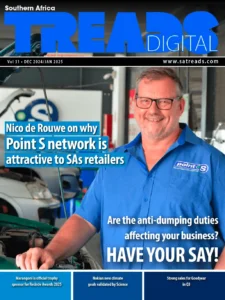The fourth and final of four outstanding CEO Breakfast events presented throughout 2024 took place at Expo Centre, Nasrec, on 19 November, the opening day of the 2024 editions of Automechanika Johannesburg and Futuroad Expo, the largest trade shows of their kind on the African Continent.
Ably led by Programme Director Andile Africa, CEO of the Automotive Industry Development Centre, the auspicious event kicked off with a welcoming address by Michael Johannes, Vice President: Mobility and Logistics of Messe Frankfurt, who gave an insight into some issues regarded as priorities in the worldwide Automechanika Organisation. He stressed that the rapidly changing environment in the automotive aftermarket, with new technology developing at an unprecedented rate, required of industry and its foremost business platform Automechanika to stay abreast of such developments and required a sharp focus on training and education to do so. This was an ongoing priority for Automechanika where new products, technologies and innovation were continually breaking ice and the Automechanika movement provided unique opportunities for training and education opportunities to be identified and acted upon.
Duncan Mutengwe, Acting CEO of the National Regulator for Compulsory Specifications (NRCS) presented a detailed presentation on the importance of compliance and the role of the NRCS in the evolving automotive landscape. The NRCS drives and enforces compliance with internationally accredited compulsory standards to ensure vehicle safety amid ever increasingly advanced technological developments such as the rise of electric vehicles, advanced safety features such as automatic emergency braking, collision avoidance and lane-keeping assist systems. He alluded to the fact that autonomous driving systems are on the horizon which would require further advanced compulsory safety specifications, to empower the Regulator to promote public and industrial safety to the highest possible standards. Duncan gave a brief overview of the NRCS processes involved which included registration by manufacturers, testing and certification and final approval and homologation.
Victor Radebe, Chief Director: Programme Management in the office of the Gauteng Premier, gave an interesting insight into the activities of the Gauteng Provincial Government in respect of its interface with the automotive and fleet sectors. He stated that the twin engines of sustainability and innovation guided the policy initiatives of the Provincial Government. He mentioned the innovative partnership by Uber and Chinese automaker BYD for the deployment of 100 000 electric vehicles as part of the global Uber fleet as an excellent example of what could be achieved through industry collaboration. In commenting on the rise of electrically powered vehicles in the market, he stressed that fleet managers would have to adopt new approaches to their fleet management functions as electric vehicles are essentially mobile IOT devices that will open new paradigms in fleet management and analysis.
Greg Cress, Principal Director: Automotive and eMobility at Accenture South Africa, said it was time that fleet managers should develop the ability to think on their feet in order to keep pace with the increasing pressure of decarbonisation and the advent of EV technology.
In evaluating a survey undertaken by Accenture of 450 senior fleet managers in various industry sectors globally he presented five considerations for fleet managers insofar as decarbonisation of their fleets was concerned, namely to accept the uncertain business case (for now), line up one’s leaders in the decarbonisation drive, institute a pilot project to break the paralysis (examples were the pilot initiatives for EV -powered vehicles in fleets operated by Woolworths and DHL) , consult experts from the beginning and to challenge accepted paradigms and models. The survey revealed that in most cases, decarbonisation initiatives were in early stages and presented a huge challenge to fleets. Of importance was the necessity to convince management boards of the financial viability of decarbonising. He recommended that fleet electrification should be made a centre stage priority in an organisation, new financial models to mitigate cost burdens should be tested, consideration be given to a structured feasibility study, formulation of a detailed design of one’s future energy infrastructure, followed by the formulation of a transition plan. He reiterated that electrically powered vehicles generated huge volumes of data that could enable a business to analyse costs and discern trends which, if acted upon, can deliver significant value in enhancing efficiencies and profitability.
Lunga Qegu, head of Sales Development at Investec for Business, shared thoughts on the perceived recovery of the South African economy which was evidenced by positive pointers. He gave details of the services rendered to clients by Investec for Business that were aimed at assisting its clients to operate more efficiently and profitably and highlighted the comprehensive importation and freight forwarding services offered. In this respect and in context of the development of EV technology, he reported that the Bank had noticed an appreciable growth in importation of battery and electrical technology which underpinned the perceived technological development towards decarbonisation.
Michael Dehn, Managing Director of Messe Frankfurt South Africa, ended by highlighting the value of the quarterly Automechanika networking, the thought leadership content shared, and the business opportunities they provided.
Automechanika Johannesburg hosted six conferences and workshops, including the Chartered Institute of Logistics and Transport (CILT), The Fleet Safety Awards, Mibco Training, Lets Torque Spanners Workshop, SAMTEA E-Hailing Conference, and the Townships Mechanics Workshop.
Automechanika once again provided a comprehensive platform for industry professionals to explore a range of products and services related to the automotive aftermarket sector. It proved an ideal platform for networking, discovering new business opportunities, and gaining insights into the future of the general automotive aftermarket. The event attracted visitors from 18 African and 29 International Countries.
Automechanika Johannesburg confirmed the dates for 2025, its 10th anniversary, running from 28-30 October 2025.







